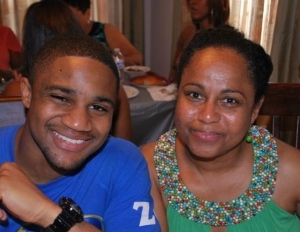On July 4, 2013 everything in my world changed. On that night, my 22-year old son, a vivacious, caring, achieving Howard University student, was shot and killed by an armed robber. I went from being merely a diplomat, mother, daughter, sister, and friend to adding the moniker of grief-stricken parent. We have words for children who have lost their parents (orphans), and wives who have lost their husbands, (widows), but none for indicating the status of a parent who has lost a child. Yet few things change one’s life more. In my pain and anger, I went on a search. I searched to gain some understanding about how it could be that my son, who lived from the ages of 5-19 in such ostensibly dangerous places as Nigeria and South Africa, would come home, at last, to America, to be murdered.
I knew from the start, that our family’s tragedy was unfortunately not unusual. Omar was one of thirty thousand or so each year who are murdered in America and one of many thousands more around the world each day. So I requested, and was granted, a sabbatical year of research, writing and activism that began in August 2014. This sabbatical, generously supported by the Uma Chapman Cox Foundation, has enabled me to become engaged in examining the causes and consequences of violence, and then to educate others about strategies to prevent violence in all its forms both at home in America and abroad. This blog space results.
In Mid September, I was joined by five student interns who asked the Department of State for an opportunity to make a difference on the issue of violence. This space is also theirs.
In these first 60 days, I have learned much. I have met inspiring researchers, community activists, my fellow survivors of violence, public servants and other professionals in the field. I have locked arms with numerous new colleagues, and am beginning to heal as a result. I hope this blog space will be useful to them as well.
In its seminal 2002 World Report on Violence and Health, The World Health Organization (WHO) described violence as a public health problem, estimated its scope and magnitude and categorized it into self-directed, interpersonal and collective violence. The WHO called upon the world to do what is possible with all health problems: diminish its prevalence and impact through preventative efforts. More than twelve years later, how have we responded to this call?
This blog space is a partial response to this call, as it aims to provide information on violence in all its manifestations and the ways and means to cure this disease, recognizing that all forms of violence are interrelated.
This space reviews and critiques the available evidence on the scope and negative consequences of violence and delves into proven and promising techniques and methods used to diminish it. We seek to increase our understanding of what makes interventions successful. I hope we will make a difference in the complex and urgent work ahead and welcome your comments, suggestions and contributions.
– Sherry Zalika Sykes, October 2014

Sherry,
I am so sorry for the loss of such a promising young man as your son. My condolences to you and your husband. I live in DC and am concerned about all of this senseless violence. I wonder what we can do.
Why did this young man who killed your son leave his apprenticeship? Why is the lifestyle of crime being chosen even when there are other options? Have people lost the notion of the Ten Commandments? When will young women stop having children without being married? Where are the fathers?
Gerri Michalska
LikeLiked by 1 person
Thank you, Gerri, for your condolences to our family. Violence is a very complex problem both at the individual level and at the communal level. Since I was a child, I always asked such questions as “why do we have war?”, “why would people lynch other people?”, why did my friend’s uncle commit suicide and devastate his family like that?” The questions arose again, even more urgently, after my son was killed so senselessly. Your questions are all quite legitimate, and the answers differ from person to person and from place to place. A lot of what I have been looking at this year, and will be reflected more and more in this blog, is comparing what societies like Australia, the UK and Canada have been able to accomplish that we have not, in terms of crime and violence. I have come to believe that it has less to do with people being good at the individual level as it has to do with our collective goodness – having public policies that treat people well – that keep everyone’s wellbeing at the center, at the population level. Sherry Sykes
LikeLike